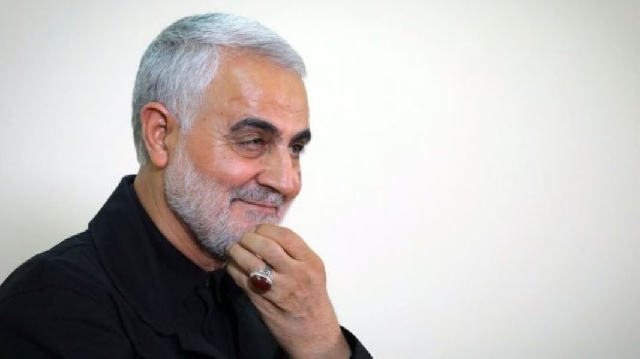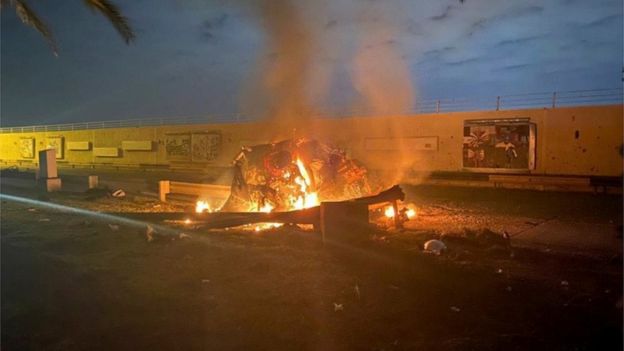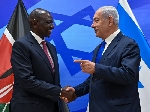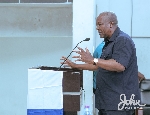US kills top Iranian general in Baghdad air strike
 General Qasem Soleimani commanded Iranian military operations in the region
General Qasem Soleimani commanded Iranian military operations in the region
Iran's most powerful military commander, General Qasem Soleimani, has been killed by a US air strike in Iraq.
The 62-year old spearheaded Iranian military operations in the Middle East as head of Iran's elite Quds Force.
He was killed at Baghdad airport, alongside local Iran-backed militias, early on Friday in a strike ordered by US President Donald Trump.
Gen Soleimani's killing marks a major escalation in tensions between Washington and Tehran.
Iran's Supreme Leader Ayatollah Ali Khamenei said "severe revenge awaits the criminals" behind the attack. He also announced three days of national mourning.
Gen Soleimani was widely seen as the second most powerful figure in Iran behind the Ayatollah Khamenei. His Quds Force, an elite unit of the Iranian Revolutionary Guards, reported directly to the Ayatollah and he was hailed as a heroic national figure.
But the US has called the commander and the Quds Force terrorists and holds them responsible for the deaths of hundreds of US personnel.
President Trump, who was in Florida at the time of the strike, tweeted an image of the American flag shortly after the news broke.
A statement from the Pentagon said Gen Soleimani "was actively developing plans to attack American diplomats and service members in Iraq and throughout the region".
"This strike was aimed at deterring future Iranian attack plans," it added.
Meanwhile, global oil prices have soared by more than 4% in the wake of the attack.
What happened?Gen Soleimani and officials from Iran-backed militias were leaving Baghdad airport in two cars when they were hit by a US drone strike near a cargo area, US media reports say.
The commander had reportedly flown in from Lebanon or Syria. Several missiles reportedly struck the convoy and at least five people are thought to have died.
 Image copyrightREUTERS
Image captionThere was burning debris outside Baghdad International Airport
Image copyrightREUTERS
Image captionThere was burning debris outside Baghdad International Airport
Iran's Revolutionary Guards said Iraqi militia leader Abu Mahdi al-Muhandis was among those killed.
The Pentagon statement said: "At the direction of the president, the US military has taken decisive defensive action to protect US personnel abroad by killing Qasem Soleimani."
It added: "The United States will continue to take all necessary action to protect our people and our interests wherever they are around the world."
The drone strike comes days after protesters attacked the US embassy in Baghdad, clashing with US forces at the scene. The Pentagon said Gen Soleimani approved the attacks on the embassy.
As head of Iran's powerful elite Quds force, Qasem Soleimani was seen as the mastermind behind Iran's vast ambition in the Middle East, and the country's real foreign minister when it came to matters of war and peace.
He was widely considered a principal architect of President Bashar al-Assad's war in Syria, the ongoing conflict in Iraq, the fight against Islamic State, and many battles beyond. Known to wield immense power, the silver-haired commander was revered by some, loathed by others, and myths and social media memes grew around him.
His death marks a decisive turning point in what is already a major crisis between Iran and the US and its allies. Escalation is expected and retaliation seems certain, setting an already volatile region on an even more dangerous course.
What has Iran said?Iran's Foreign Minister, Javad Zarif, called the attack an "act of international terrorism", tweeting that the US "bears responsibility for all consequences of its rogue adventurism."
Mohsen Rezaei, the former commander of the Revolutionary Guards, said Iran would take "vigorous revenge on America". A spokesman for the Iranian government said the country's top security body would meet in a few hours to discuss the "criminal act of attack".
"Iran and the other free nations of the region will take revenge for this gruesome crime from criminal America," President Hasan Rouhani said in a statement.
His death has "redoubled the determination of the nation of Iran and other free nations to stand against America's bullying", he added.
Who was Qasem Soleimani?From 1998, Maj Gen Qasem Soleimani led Iran's Quds Force - an elite unit in Iran's Revolutionary Guards, which handles clandestine operations abroad.
Iran has acknowledged the role of the Quds Force in the conflicts in Syria, where it has advised forces loyal to President Bashar al-Assad and armed thousands of Shia Muslim militiamen fighting alongside them, and in Iraq, where it has backed a Shia-dominated paramilitary force that helped tackle IS.
These conflicts turned the once-reclusive Gen Soleimani into a something of celebrity in Iran.
The Trump administration has alleged that the Quds Force is "Iran's primary mechanism for cultivating and supporting" US-designated terrorist groups across the Middle East - including Lebanon's Hezbollah movement and Palestinian Islamic Jihad - by providing funding, training, weapons and equipment.
US Secretary of State Mike Pompeo designated Iran's Revolutionary Guards and its Quds Force as foreign terrorist organisations in April.
Source: BBC
Trending News

Sign Ghana National Service Authority Bill into law – NSS begs Akufo-Addo
10:53
MoH receives first batch of donated medical supplies after a year-long port delay
02:51
Akufo-Addo and Ouattara inaugurate Côte d'Ivoire-Ghana Cocoa Initiative Secretariat today
07:45
Geopolitics split African states’ response to Iran-Israel tension
10:37
Jefferson Sackey advocates peace and tolerance at Eid-ul-Fitr celebration
02:04
Akufo-Addo commissions Kumasi Thermal Power Plant and Genser Energy Kumasi Pipeline
06:27
Gov’t releases ₵26m to institutional suppliers
11:52
PAC orders East Gonja Municipal Assembly to pay contractor GHS92,704 with interest
06:09
Feeding grants'll be paid directly to school heads in my next gov’t – Mahama promises
11:02
Lack of public purse protection ‘pathetic’ – Sam Jonah calls out ‘weaponisation of state agencies against opponents, assault on press freedom'
04:02



